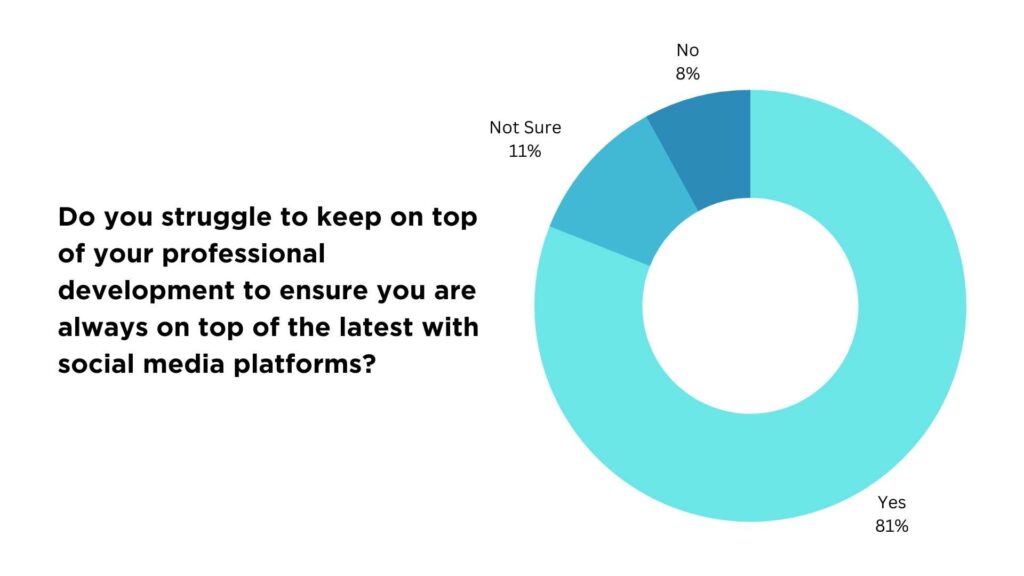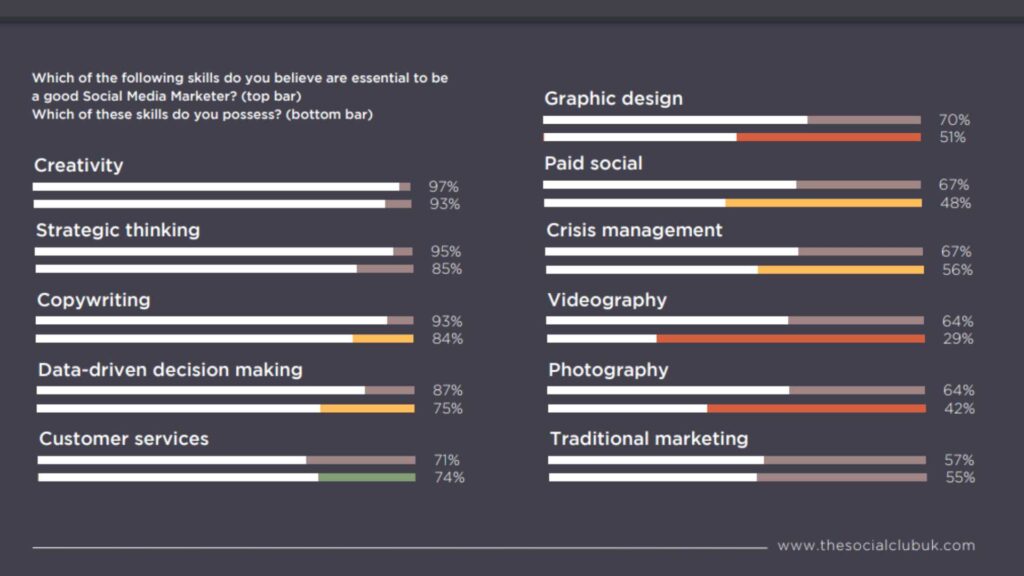
Social media is one of the most quickly evolving areas of digital marketing. So, your social media marketing team needs to keep pace with customers and competitors alike.
From new social platforms and changing algorithms to the latest technologies and trends, marketing is unforgivingly fast-paced. It comes as no surprise that social media marketers are struggling to keep up.
In a recent survey by The Social Club, it was found that the accelerated pace of social platforms is becoming overwhelming for social media marketers. 81% admitted that it was a struggle to stay on top of the latest trends and technologies.

Other marketers struggle to develop the wide range of must-have marketing skills needed to perform the diverse role.
As a result, performance, knowledge, and skills gaps can grow within social media marketing teams—and they can wreak havoc. Luckily, you can combat gaps by identifying and addressing them in a variety of ways.
So, let’s discuss how you can identify and tackle gaps within your team. And in doing so, how you improve productivity, future-proof your business, and equip your team to meet social media marketing goals.
Evaluate Your Team’s Skill Sets & Experience
Before you can identify skills gaps, you need to establish the skills and experience your team currently possesses.
So, start by conducting an in-depth evaluation of your team’s current skill sets, experience, and knowledge. This will present you with a comprehensive inventory of skills that you can align with your business goals.

Are You Ready to Master Social Media?
Become a Certified Social Media Specialist and learn the newest strategies (by social platform) to draw organic traffic to your social media sites.
Ultimately, it helps you determine where your team thrives and where it falls short.
But how do you go about this?
As a best practice, consider using several different methods of evaluation to get a reliable picture of your team’s current skill set. For example, you might:
Create a Formal Test
Formal tests can be used to assess the technical and theoretical competency of your employees. For example, you can test how effectively employees are able to use a certain tool. Or, you can assess how aptly they identify a particular framework and apply it to a situation.
While this is a popular evaluation method, there are some limitations to consider.
Formal test conditions don’t always present a reliable picture of proficiency. Some people perform worse in test conditions due to stress and anxiety. Other people might display competency in test settings but are unable to apply this knowledge in real-life scenarios.
So, consider using formal tests alongside the two other evaluation methods that we’re going to discuss below.
Conduct On-the-Job Observations
Observing real-world performance is one of the best ways to accurately gauge your team’s skill set.
On the job, are your employees able to efficiently utilize technologies to meet goals? How effectively do they communicate and collaborate in fast-paced environments? Are they applying their skills, knowledge, and experience to a standard you’d expect?

In-person assessments allow you to observe your team within the everyday work environment. Compared to formal tests, they can give you a more accurate representation of employee performance. But, there’s still the risk that employees’ nerves may alter their performance, which can skew the results of your evaluation.
And of course, in-person observations simply aren’t possible if you’re a remote team. So, you might have to use another method: performance management technology.
Utilize Software to Measure & Evaluate Performance
Instead of relying on in-person observations, you can enlist the help of software to track your employees’ performance. This includes tracking whether employees meet project deadlines, reach benchmark KPIs, and are otherwise engaged in and attending to their responsibilities.
The data obtained from software can help you identify performance gaps. Performance gaps are just as critical to identify and address as skills and knowledge gaps, as they damage productivity and negatively impact your bottom line.
In many cases, performance and skills gaps overlap in some way.
For example, underperforming employees might lack the skills or knowledge they need to perform their roles effectively. Similarly, employees who regularly miss work might lack motivation or feel dissatisfied in their role, which can arise as a result of a skills gap.
To combat this, an HR performance management system with an attendance tracker feature enables you to track performance and attendance in real-time. Attendance software automates the process by identifying absence patterns and quickly alerting you to potentially struggling employees. As a result, you can uncover and tackle performance gaps more efficiently and effectively, all while supporting your employees and earning their loyalty.
Establish Your Team’s Objectives
Setting realistic, unified team goals and objectives can close performance gaps that may be hurting your productivity. When team objectives are misaligned or unachievable, employees disconnect from them. This leads to disengagement and poor motivation.

Are You Ready to Master Social Media?
Become a Certified Social Media Specialist and learn the newest strategies (by social platform) to draw organic traffic to your social media sites.
However, when you set clear, realistic objectives and empower your team to achieve them, you can boost productivity and close performance gaps.
Establishing team objectives can also help you identify skills gaps.
Let’s say that your team really wants to grow its followers on Pinterest. As you proceed to devise a Pinterest marketing growth strategy to meet this objective, you might discover that your team doesn’t know enough about Pinterest to execute this strategy effectively. So, you’ve identified a skills gap.
Armed with this knowledge, you can quickly target this skills gap by hiring a marketer with the relevant experience. Or you could upskill your employees—more on this later.
Identify Areas for Skill Development
Now it’s time to dig a little deeper and identify any specific skills gaps that exist within your social marketing team. Chances are, you’ll find some—53% of companies currently have a skills gap, according to research by SHRM.
Skills gaps can arise for a variety of reasons. Talent shortages, poor training, lack of experience, and failure to keep pace with new technologies can all result in skills gaps that put your company at a competitive disadvantage.
With a fine-tooth comb, inspect your team’s digital marketing skills, experience, and objectives to illuminate any areas for improvement. For a social marketing team, the most pressing and common skills gaps include graphic design, videography, and photography.
Provided by The Social Club, here’s an example of what social media marketers deem to be essential skills, compared to how many marketers feel that they actually possess these skills.

Provide Continuous Training & Development
Before you rush to fill your skills gaps by hiring new employees, consider upskilling your current employees first.
Upskilling is a learning and development strategy that involves providing continuous training to employees to help them learn new skills. There are a bunch of benefits to doing this—it’s more cost-effective, it boosts productivity, and it even increases employee satisfaction and retention. 71% of employees who took part in employer-provided upskilling opportunities say that it increased their overall job satisfaction.
That said, any old training program won’t do. Training content needs to be delivered strategically, with a focus on keeping it engaging and interactive to maximize knowledge retention.
Here are some top tips for training your social media marketing team:
- Create visually engaging and interactive online training videos
- Utilize other interactive training methods too, like memory games, quizzes, and puzzles
- Assign employees to a mentor for 1-on-1 training and development sessions
- Create a centralized online knowledge base packed with valuable content (how-to’s, blog posts, indexes, etc)
- Offer bitesize training modules to help employees retain knowledge
- Most importantly, provide opportunities for them to exercise their new skills
Seek Feedback From Customers
Your customers are invaluable information sources. Their feedback can shed light on areas that your social media marketing team needs to improve on, driving learning and development initiatives in the right direction.

Are You Ready to Master Social Media?
Become a Certified Social Media Specialist and learn the newest strategies (by social platform) to draw organic traffic to your social media sites.
There are lots of different ways that you can request feedback from your customers. Follow-up emails, social media, and website surveys are just a few examples. And you can request feedback on pretty much anything you want, from the quality of your YouTube videos or Instagram photos to the consistency of your brand’s voice across your social channels.
Just make sure to avoid common customer survey mistakes if you want to garner the best results.
If you’re still struggling to obtain customer feedback, there are different ways to tap into what your customers are thinking without asking them directly.
Reviews left on third-party websites like Google and TrustPilot can be a source of valuable feedback. Try encouraging customers to leave reviews which you can use to accumulate useful information. For example, recurring pain points that come up in reviews may uncover hidden skills gaps or performance gaps within your team.
You can also use social listening tools to monitor what customers are saying about you online.
Review Your Team’s Workload
A heavy workload hinders productivity and is one of the leading causes of performance gaps. But it can exacerbate skills gaps, too.
Without the means to undertake professional development, employees can quickly fall behind competitors. Remember, 81% of social media marketers struggle to stay on top of social media marketing developments.
The same study found that 53% of social media marketers claim that it takes over an hour a week to keep on top of the latest marketing trends. 10% say that it requires over two hours of dedication a week.
Put simply—if your team has a heavy workload, keeping up just isn’t possible.

Assess your team’s workloads and, with the assistance of your employees, adjust them to free up time for learning and development. Through this process, you might also realize that you can reallocate resources to maximize skill utilization and reduce skill gaps.
An employee who excels in paid advertising, for example, should invest more time in utilizing and refining those specific skills. Or, if various team members are tackling campaign management alongside their other duties, it might be wise to hire a dedicated social media marketing manager to unburden these responsibilities. This provides more time for learning and development while also closing a skills gap.
Consider Hiring Additional Team Members
Sometimes, hiring new team members is absolutely essential.
For example, it could be that your team completely lacks the necessary experience to fulfill duties in a complex area, like social media analytics. Or, it could be that your team’s workload is so heavy that it’s impossible for employees to leverage all of the necessary skills to their full capability.
In these scenarios, look into bringing new team members on board. But be careful—a poor hiring process can result in bad hires and a host of other issues. Not only can this widen skills gaps even further, but it can seriously damage your team’s overall productivity.
So, it’s critical that you precisely identify the skills and experience that you need a new hire to possess. From there, you can create job ads that accurately detail the responsibilities of the role, increasing your chances of attracting high-quality candidates.
Using talent acquisition software, you can then leverage AI to automate the labor-intensive candidate sorting and screening process. Talent acquisition tools can match and score candidates according to your preset rules, dramatically reducing the time it takes to find the best candidates to interview.

Evaluate Your Team’s Culture
A team culture that is misaligned with your company’s values and objectives can contribute to performance and skills gaps. This is why it’s so important to continuously evaluate your team’s culture, nurturing positive cultural traits and weeding out any negative traits.
Performance monitoring and attendance tracking software can help you identify engagement issues and tackle their underlying cause. Gathering employee feedback via pulse surveys and eNPS surveys can highlight areas for improvement that you may have otherwise missed. And external employee review sites are also a useful way to glean honest, unfiltered insights into your team’s culture.
To effectively close performance and skills gaps within your social marketing team, work on fostering a culture that embraces knowledge-sharing, unity, collaboration, and continuous learning and development.
Key Takeaways
As the latest digital marketing trends, technologies, and platforms continue to emerge at an accelerated rate, knowledge and skills gaps are bound to crop up. It’s vital that you empower your social media marketing team to keep pace with competitors and meet marketing goals by identifying and addressing gaps.
Once you’ve identified gaps through observations and analysis, you can work on closing them the right way. The best ways to tackle gaps in your team include providing continuous training, hiring experienced employees, and adjusting your team’s workload.
[TAG9]The post Are Skill Gaps Holding Back Your Social Media Marketing Team’s Potential? appeared first on DigitalMarketer.
Frequently Asked Questions
What motivates entrepreneurs?
Passion drives us. But we also have an innate desire to create something meaningful that makes a difference. To make a lasting difference for our loved one and ourselves.
To give back. To help others. To leave a mark.
We love it. Because we feel compelled by God to live our lives fully and succeed in things that matter.
We are driven by a sense and purpose that cannot be satisfied with money alone.
The key here is to find a way to combine business with pleasure. This is where entrepreneurship becomes more than just a job; it is a lifestyle.
This is why I am passionate about helping entrepreneurs become successful. My goal, as an entrepreneur, is to enable them to reach financial freedom and leave a lasting legacy on the world.
It's the only way to create value. I am living proof of this. The sharing of your knowledge and expertise to the rest.
It's more than enough to make a product or service great. To understand your customers and what their needs are, you need to first get to know them. They want what they need.
You'll always be able to improve your offerings if you do. And therefore, you'll always provide more value.
If you can offer more value, customers will come back. Plus, more customers will mean more sales. Selling more products and services will result in more revenue. In the end, financial independence is possible if you are able to generate more revenue.
You see, money isn't everything. It's the end in itself. It's not an end in itself.
To truly live a rich, fulfilling life, you can't focus on just money. You must also focus on making a positive impact. Contributing. Leave a lasting legacy. Create something unique. It's something that is unique. Something that adds meaning to your life and the lives of other people.
Entrepreneurship requires risk-taking. It does not require following set rules. Flexibility is what it means. Adapting. Adjusting. Improving.
As long as you stay true to yourself, keep your values intact and maintain integrity, you won't fail.
Entrepreneurship should be considered a calling. A vocation. The chance to give back. To create wealth. To create history.
If you embrace these things, you'll be the best you.
You will be unstoppable.
Why is motivation important to an entrepreneur?
When we feel lost or stuck in life, motivation is the fuel that propels us forward. It gives us the power to face our fears.
Motivation is key to success. Motivation is a driving force behind success. If we lack it, we can become laziness, unmotivated and unproductive, which ultimately leads to failure.
You can unlock your potential by finding ways to motivate you. It is important to find a way that motivates you throughout the day.
Think of it as a muscle. The harder you exercise it the stronger it gets. It starts to weaken and atrophy if it isn’t exercised.
Self-motivated entrepreneurs are the best. They set goals, plan their progress, and then follow through.
Sometimes, however, you might need some help to stay motivated. These are three simple steps that will help you stay motivated.
Step 1) Get inspired. Find an inspiration figure. Someone who is already doing what you desire.
Step 2. Establish small goals. Make sure each goal is achievable. You should be focusing on the next step and not the final goal. You can reach big goals quicker by breaking them into smaller pieces.
Step 3. Reward yourself. You can reward yourself when you reach your goals. You don't need a reward to be material. It could be as simple as taking the time to do something that you enjoy.
Remember that motivation is a choice. Choose to be happy, choose to be successful, choose to live life abundantly.
Get started today if your goal is to make positive changes in your daily life. The first step is to decide to change. Next, take action. You can start living the life of your dreams now.
What makes an entrepreneur succeed?
There are two types if entrepreneurs: those who make money or those who work part-time.
Their approach to their business is the difference. Those who make money concentrate on making more money, while people who make a lot of time work harder to make more.
People who make money are motivated by financial freedom. Their goal: to be wealthy and stay rich.
They are motivated by fear, greed, and a sense of entitlement. They care little about the long term because they know that they will be set for life once they reach their goals.
This type is often called a hustler. They are focused on the bottom line and seek ways to increase revenue, without regard for quality.
Some make time. These entrepreneurs are driven by passion. They want to create something that is meaningful and will last forever.
Their motivation is altruistic. They are motivated to do great work. They care about creating products or services that have a positive impact.
They are often called dreamers. They are driven and inspired by vision. They are aware that success is hard work, persistence and dedication.
The most important trait of these entrepreneurs is their creativity. They are constantly looking for opportunities that have never been seen before.
They thrive on the unknown. They are happy to spend hours researching a topic of interest. They love to learn new things and are open to new ideas.
It is also why they are adaptable to changing situations. They don't mind getting dirty or doing whatever it takes to win. The only thing they won't tolerate is mediocrity.
Which type of entrepreneur is it? Are you driven by making money or seeking meaning?
Congratulations if you answered yes both questions. You are a successful businessman.
I've had the pleasure of meeting many successful entrepreneurs over my career and one thing struck me was their passion.
The only thing that defines successful entrepreneurs is their financial wealth. Their impact is what defines them.
Steve Jobs, who was not rich but well-known for his philanthropic efforts, is an example. He was only in his mid-40s when he bought his first house.
His ability create products that changed the course of history was his greatest source of wealth. And this is what makes him unique.
Your job isn't to accumulate wealth. It's not about building empires and amassing power.
Your job is to build relationships with customers and partners. To build trust. To make others successful.
To have a positive impact. It is your legacy. This is your legacy, not your bank accounts.
And if you're ready to start building a legacy that matters, let's talk.
Social Media University will teach you how to generate passive income online. We will teach you how to market and grow your business.
What are the 6 most important questions that motivate an entrepreneur?
Motivation is the foundation of any business. Without motivation, you won't make it out of bed each day. Without motivation, it'll be hard to finish your projects. Without motivation, it's impossible to reach your goals. So, how do we find our motivation?
You may wonder, "What motivates my mind?" But the answer might surprise you. Perhaps you have been asking this question for years. You're missing one of the greatest rewards in life, the chance to find your motivation.
There's nothing more motivating than discovering why you exist. When you discover what drives you, you can finally feel fulfilled. Your purpose becomes clearer. What are you passionate about? When you figure that out, you'll find it much easier to stay motivated.
Looking within is the key to unlocking your motivation. Ask yourself these questions:
- What is my passion?
- What makes my heart beat faster?
- What lights me up inside?
- What gives you butterflies in your stomach?
- What makes me feel alive?
- What motivates you to come back to your work again and again.
Once you know the answers to your questions, you will be able identify your true motivations.
Your motivation will help you get through those tough times. It will help you find the strength you need. It will motivate you to work harder. It will motivate you to succeed.
You'll never stop wondering what your motivation is if you are like me.
Take some time to reflect on what motivates you. You might be pleasantly surprised at what you uncover.
What's your greatest motivation in life?
Do you want to know my top motivations? Let me tell it. It is the best motivator in my life to make people feel better. To make them realize that they are amazing, because they are. They are worthy and deserving of love.
They are worthy of happiness.
I am here to remind everyone that it is more important to feel good about yourself. Nothing. And I will do everything in my power to change the world.
Because when we feel good about ourselves, we become more open minded and compassionate towards those around us. It's a great thing to stop judging others based on superficiality. Instead, we start to see the person inside.
It is the best way to motivate people to believe that they have everything they need.
It may be something they didn't realize, but it's why they've been struggling for so long with something. Because they knew deep down within they had the power and ability to heal themselves.
They needed the right environment. The right support system. And the right mindset. But somehow they lost sight of that.
It's not hard to see why they lost it. Because they were too focused on figuring out the source of the problem. They were trying to fix it all they could, but they didn't realize they had all the tools to do it.
They also forgot to mention that the main reason they couldn’t solve it was because the answer wasn’t in their heads.
So I am here to remind you that you have the ability to create an entirely new reality. All you have do is tap into your inner genius.
Everything will come together once you do this. You'll be amazed by how easy it is to manifest your dreams.
You see, I believe everyone has access to their own unique superpower.
We only need to learn how it works.
How can entrepreneurs motivate their employees to do well?
Motivation can come in any form. It doesn't matter from where motivation comes, as long as it inspires people to take action. Motivation is important for every business, regardless of whether it's a stick or carrot approach.
The more motivated employees feel, the better they will perform. To make your team more productive, empower and engage them.
You have to give them a sense of belonging. They need to feel valued and able to learn. They can share their ideas freely without fear of being punished.
It is important to create a culture within your company that encourages employees to flourish and be successful. This is how you keep your top talent happy, productive, and loyal.
To maintain the culture you have to reward the successful behaviors. This can include bonuses when goals are achieved, training opportunities, raising pay raises, and providing perks like insurance.
Communication and clear direction are essential. Ensure everyone knows what's expected of them and why.
Make sure you have written policies and procedures. It is important that you designate someone to ensure that your policies and procedures are being followed.
And most importantly, communicate frequently. Keep your team up to date about what's happening within the company. Let them know about the latest developments and plans.
Communication is essential, and taking care of your team will ensure that you remain ahead of the rest. They will take care you.
It could cost you big time if you don't have a good relationship with your employees. Studies show that companies with high levels of employee engagement enjoy higher productivity and profitability than those who struggle to retain their top performers.
It is important to realize that not all employees want to work at the same speed. Some prefer to work independently while others like to work in a team. There are many ways to motivate individuals, and you can choose your own.
One example is that some people respond better to recognition, while others may prefer incentives. Whatever works for your company, ensure that it is consistent with its goals.
The leader is ultimately responsible for setting the tone. Open-mindedness is key. Listen to your team. Keep in mind that if something is to be done right, it has to be done yourself.
Statistics
- “Life is 10% what happens to you and 90% how you react to it.” (oberlo.com)
- “If you look to lead, invest at least 40% of your time managing yourself – your ethics, character, principles, purpose, motivation, and conduct. (americanexpress.com)
- Our 10 years of research also shows that 75% of mentored entrepreneurs increased their revenue, and 82% of their businesses survived the first two years. (carolroth.com)
- According to analysts, Johnson has high appeal in all four quadrants tracked at the multiplex: male, female, over-25 and under-25. (forbes.com)
- That means for $150,000, you could have bought 10 percent of Airbnb." (entrepreneur.com)
External Links
[TAG29]
[TAG32]
[TAG34]
- 101 Best Inspirational Quotes For Entrepreneurs
- Why Elon Musk sets nearly impossible goals for SpaceX employees
[TAG37]
How To
Are You a TRUE Entrepreneur?
True entrepreneurs are people who create value for themselves and others. He is risk-averse, he creates businesses, and he earns money.
He doesn’t wait for anyone to offer him a chance; he searches for them himself. He is a self-starter and a leader.
A true entrepreneur can quickly make and execute decisions. He sees the problems clearly, and solves them creatively.
According to him, there is no difference in business and life. To him, entrepreneurship isn't a job; it's a way of life.
True entrepreneurs do not fear failing. Failure is a part of success. True entrepreneurs embrace change, and thrive under pressure.
They are determined to achieve success and growth. Most importantly, they love what they do because they enjoy creating value.
They want to not only build successful businesses but also create happy lives for their families.
So next time you feel unmotivated or confused about whether you should start your own business, ask yourself this question...
"Am I a true entrepreneur?" If you answered yes, then go ahead and take action. If you answered "No", then it might be time for you to rethink your career path.






